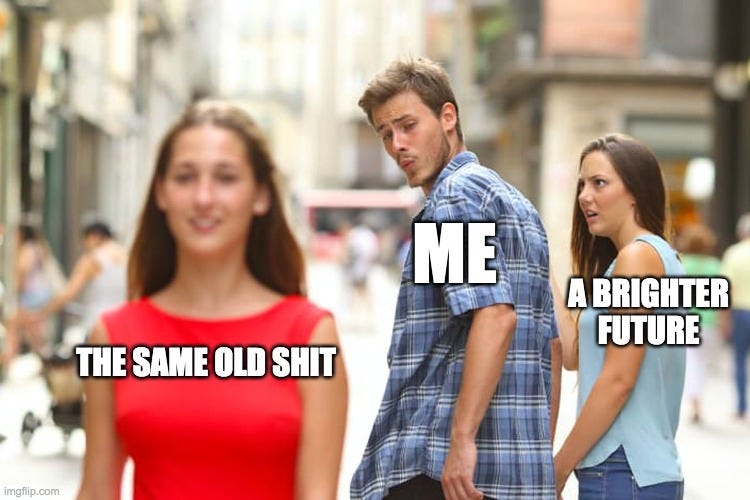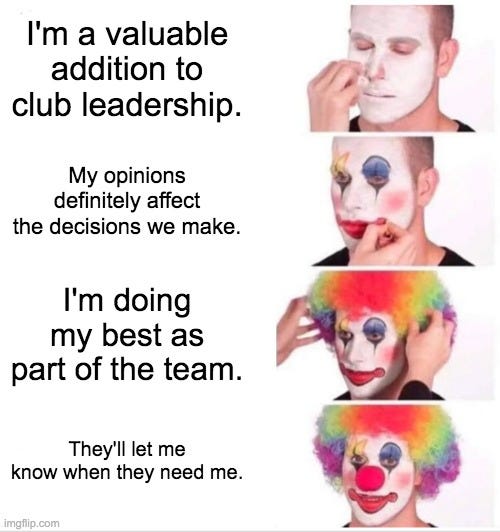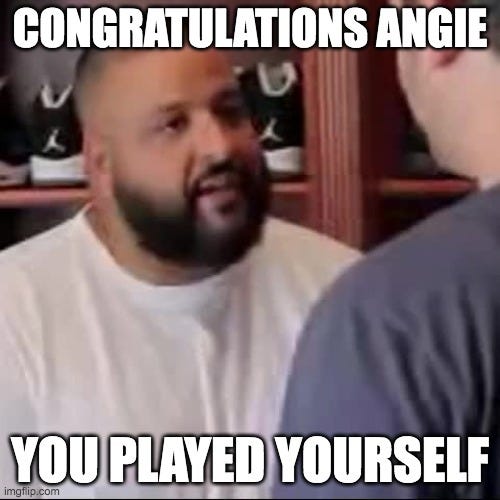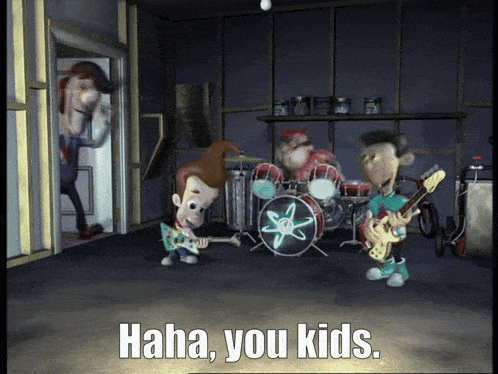I’ve written before about the fact that I am trying to figure out what I want to do next in life.
In general, I struggle to be real with myself and to make big decisions. In both of my jobs, I’ve learned about some of my likes and dislikes, but I haven’t exactly reached the conclusion of “X industry is right for me” or “Y job is what I want to do someday.”
The problem, of course, is that I’ve worked for start-ups, which has meant taking a relatively low salary in exchange for more independence and the ability to “get in on the ground floor” of a potentially successful venture. For instance, there’s a chance that my current real estate job could work out in a big way, but there’s also a (probably more likely) chance that it could go up in flames, like my last job in biotech.
My approach is to generally work very hard, which I know my employers have appreciated. Being a diligent employee has definitely helped me advance within the companies I’ve worked for, even if I’m effectively “advancing” effort in exchange for later promotions.
Unfortunately, I’ve had an epiphany: I’m not a lunch pail, gym rat, first one in/last one out kind of guy. It’s all a facade. The reality is that locking in is how I procrastinate.1
I find it easier to answer the direct questions and solve the problems in front of me, rather than having to think bigger and more long-term. If I was smart, at a certain point I might realize that cutting my losses and moving onto a new opportunity is more productive than grinding away.
I started this blog to figure out what I wanted to do next, but that hasn’t really done anything for me so far.
The next step is adding more explicit structure. Over the coming days, I will be listing out a number of the various activities in which I’ve participate, which ones I especially liked or disliked, and what I’ve learned from them.
Tonight, we’re starting with a selection of student government roles I took in high school and college and try to figure out whether they actually taught me anything at all. This is:
The Return of Performative Leadership.
When I was around 17, I first began to consider the idea that most parts of life may have less structure than a classroom. This was a problem for me.
Historically, I motivated myself by relying on the non-negotiable framework created by authority figures like teachers and coaches. Without rigid marching orders and an accountability system, I just didn’t feel any urgency.
This began to become apparent in high school clubs. I was Secretary for our school’s Arts and Entertainment Society, which put together a student-run musical each year. I remember committing a lot of time to playing trumpet in the Pit Band, but don’t recall anything I did in my actual position as secretary.2 None of the other students really cared though. Ultimately, a couple of my peers had the whole thing under control and I wasn’t particularly looped in, but I did what I could to help out while enjoying the use of my title on college applications.
Most people don’t want to confront each other with bad news or heavy criticism. They’d rather struggle through the assignment, complain about the person dropping the ball behind close doors, and try to avoid working together again in the future.
Funny enough, I was also the Secretary of my high school Senior Class. I know - I dreamed big. This was a bit different than the A+E Club, since our council met more regularly, had more responsibilities, and all belonged to the same year. Still, I didn’t have a whole lot to do; my regular duties included taking notes on our meetings and then posting them into the shared Google Drive. Easy, right? Apparently, it was too easy, based on my pathetically half-hearted and generally unpublished minutes.
There were instances where I felt excluded from the class council, like my opinion didn’t really matter. In my angsty teenage brain, I definitely had some kind of “if you don’t accept me at my worst, you don’t deserve me at my best.” Of course, I was the one who had it backwards. I needed to walk before I ran, and I needed to do my actual job so that I could earn the trust for other responsibilities.
One day, the class president told me as much when she chewed me out for once again failing to post the notes. It was embarrassing and unfortunate, but she was right, so I posted the notes. For the first time, it became clear that people were relying on me. Note-taking is dumb and tedious, but it was my job and one I had signed up for. Treating it like a joke was not fair to my teammates. This was a big first step I had needed to take.
The best governor since Kristi Noem
In my freshman year, I was elected governor of my residence hall. This made me responsible for putting on $16,000 worth of programming for my community - including giving out food, bringing in activities, and planning events. This was… a bumpy road. Members of my team were much better about bringing fun ideas to the table and actually making them happen.
I think that I fashioned myself as an organizer and empowerer as I put teammates in touch with community counter-parts. I tried to effectively represent the dorm at the campus-wide level, but those were just play politics which distracted from what should have been my core goal of improving my community. There was no plan for hitting a certain number of programs per month - I didn’t even know how much money we had left in our budget at the end of the year. Whomp whomp.
In hindsight, I took a slapdash approach, and members of my team most definitely noticed. The community director even tried to have me impeached! But I’m like Clinton, and her efforts totally fizzled in the face of my unbridled savvy and likability. (Translation: the person she approached about impeaching me happened to be a friend.)
Now I was 19, and I was finally beginning to understand the truth: if I waited for someone to tell me if I was doing something right or wrong, I would be waiting forever. If I wanted people to like and trust me, I needed to independently. follow through on my responsibilities
The next year, I tried a couple different activities, including joining the student government’s Affordability Task Force. I saw this clear need to be a self-starter play out over and over. For instance, we planned to launch a website to identify ways students might be able to save money. We had baked up all kinds of content concepts, potential partnerships, and marketing strategy, but we never actually put in the work to build the site. Then, the leaders of the student government said that they’d put us in touch with alumni who had access to older resources we could use, but they never did. No accountability - just ideas thrown around in meetings with zero follow-ups.
The next year, my friends Nick and Carter led the ATF, and they had a much more targeted agenda. Our group’s sole goal was to tackle textbook affordability by getting professors to sign a pledge to keep costs controlled for their course materials. It was satisfying work where we could track our progress in real time and know we were making a difference. The only problem? Most of the team didn’t actually go out and get pledges signed. Such was the pitfall of a volunteer gig, run by students and for students. Our accountability system was checking in on our abilities to hit the target number of pledges signed per person, which seemed to be considered optional.
Funny enough, this was a concrete and measurable structure, which was the kind of system where I thrive. I had no issue collecting signatures. This was the first time I was on the side of the doers instead of the dead weight, and it felt good.
Just having fun with it.
I’d been the one who dropped the ball. I’d seen what it looked like when other people dropped the ball. Now, it was time to actually pull my weight.
In 2019, I was 21 years old, and my world began to shift.
In the UNC Senate, I was the Oversight and Advocacy Chair. Our job was approving students from student government to boards across the campus. This task was (usually) simple but very inefficient. At the end of the year, I even tried to draft some new rules which could improve the process - the next student government entered and immediately voted to repeal all my hard work as their first order of business,3 but I still enjoyed the process of speaking to different stakeholders, understanding what they liked and didn’t like, and trying to find a better way.
Beyond that, I actually engaged with other members of the student government who had nothing to do with my actual role. I began to see my job description as the bare minimum, and I spent more time with others on the Senate around campus as we tried to be more productive than just arguing about Robert’s Rules of Order. It was social, and it was exciting! Sure, I had to deal with all the little tediums of running meetings, keeping attendance, and, yes, even uploading notes, but all that work seemed a lot less laborious when it was mixed in with the things that I actually wanted to do.
My peers were impressed enough with my approach and attitude that they nominated me to run the Joint Governance Council, a monthly meeting of undergraduate and graduate student leaders. The role was cut short by Covid, but it was the first time in my life that people had seen my style and actually wanted more. Just the nomination and the two meetings we did have were incredibly validating.
It was a long and mostly redundant journey, but I had learned a lesson that Jimmy Neutron’s dad taught to me when I was seven:
Takeaways
Having written all of this out, I’m somehow just realizing that I’m not sure if I particularly enjoyed student leadership. I did so much of it that it became part of my personality and something I expected to participate in. Making decisions, getting the inside scoop on the institution, and being around peers who shared my serious and straitlaced approach were all fun, but they came with a lot of stress and insecurity which I probably could have skipped.
I was not (and am not) very good at politicking. I care way too much about what other people think of me, and I wear my heart on my sleeve. I can get caught up in my own timelines and goals without thinking about their impacts on the people around me. There’s a confidence and air of control that great politicians and leaders have, and it doesn’t come naturally to me.
At the same time, I always loved getting to know new people and building relationships. Organizations where people were loyal to each other and held each other accountable were where I thrived.4 I liked, and still like, the sense of security that comes from a team locked in place for the foreseeable future. Processes were especially interesting to me - understanding why we did things in a certain way, whether we could be creative in improving them. I savored the opportunity of finding arbitrary procedures5 and adapting them to become more practical.
Most important, today’s reflection has helped me realize how ineffective I feel in hands-off, strategic roles. Thinking about the long-term is a lot of fun, but I’m really at my best when I have tangible tasks and deliverables. Even if I’m delegating some work to other people, I don’t necessarily feel comfortable creating a plan and expecting another person to carry it out entirely.
Applications
A couple quick thoughts:
In general, I’m not much of an activist. I think that many of my convictions lack depth, since I’m often more motivated by externalities than an internal ethos. I need to find a career that lights a fire in me, or a career which doesn’t require one.
Between the aversion to politics and interest in doing hands-on work, I’m not sure if I would ever want to be an executive at a big company. (Smaller companies would probably be fine, though.)
When I think about my potential interest in the law, the lack of a poker face and the interest in interacting with people becomes a pickle: I don’t think I’d want to spend a lot of time deep in conflict with other attorneys, but I also don’t think I’d be happy as a back-office guy grinding out contracts away from everyone else.
Real estate definitely has a lot of the hands-on work and ability to meet new people, although I would have to work hard on my negotiation skills if I really wanted to be successful.
A return to biotech or other technical role could also make sense, although I’d need to be in a reasonably social environment.
Lots to think about.
More of these posts will be coming in the next 10 days, as I try to dig deeper into this exercise. (I may already breaking the one post per week rule. Drat.)
If you have any questions, or end up inspired and do a similar exercise yourself, let me know!
Yes, I recognize the irony.
Typical performative leadership.
But I’m not salty.
This same loyalty is part of the reason why I’m so hesitant to jump jobs.
Instances where things were done a certain way because “they’d always been done that way.”







Looking forward to reading this series! You should still only post once a week (easier to engage with it once a week lol), though if you're feeling particularly productive you could knock out a couple of weeks to give yourself some wiggle room in the future.
What’s an OER?